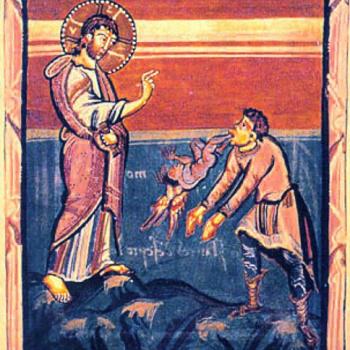
Is the Holy Spirit a “He”? Is God’s Spirit male?
I get these kinds of questions from students or friends from time to time. It’s a good question because it forces us to go back to the Scriptures to see what is there. Therefore, this blog series will take such questions seriously and help to provide a “thick description” of how Scripture characterizes the Holy Spirit.
First, the problem, what pronouns should we use for the Holy Spirit in English translations of the Bible? Against the use of “It,” this language de-personalizes the Spirit. According to the New Testament, the Spirit speaks, exercises a will, and sometimes interacts in a personal way. Against the use of “He,” the Spirit is not identified as male or masculine. If and when we refer to the Spirit as “he,” we begin to limit the unique nature of God’s Spirit. According to the biblical tradition, the Spirit is not a creature classified according to sex or gender. Humans have these traits: lineage and ancestry, flesh, birth, and capability of having children and progeny (in theory). These things are true of Jesus Christ; thus, because of the incarnation Jesus is a “he.” But we cannot say the same of the Holy Spirit. There is a classification of beings that the NT refers to as “spirit/spirits,” and none of these are attributed sex, gender, flesh, ancestors, or progeny. Some of them have names, like Legion (Mark 5), but there is no clear indication that this makes the spirit(s) a “he.”
What does the Greek say?
The Greek word pneuma is neuter. That of itself doesn’t really tell us much. Words have grammatical gender, but most often this doesn’t mean anything ontologically about the referent. There are a couple of interesting things to say about this. First, occasionally the Spirit is referred to using a title, like “The Comforter” (John 15:26). In that case, the descriptor is masculine, but again that doesn’t “genderize” the referent. It is a “generic” masculine, a grammatical category where no male-ness is implied. Sometimes, even though pneuma is neuter, a masculine pronoun is used; it is exceptionally rare (see ekeionos in John 16:13). Again, this does not “genderize” the word. It is a generic use of the masculine. The word ekeionos doesn’t really mean “this man,” it means “this one” and points to the referent that presumably has been identified at some point. The pronoun will match the referent in grammatical gender, and remember the grammatical gender is almost always arbitrary (or disconnected from “maleness” or “femaleness”).
If you don’t know Greek, just take my word that looking up pronouns in your English Bible won’t be of much help, and the same is basically true of the Greek text.
In the next blog post in this series, we will talk about the category of “spirit” (pneuma) and what this might tell us about this unique species (are “spirits” their own “species”? See how hard this is!). That complicates the matter more, but we will need to factor all of that in to how best to describe the Holy Spirit in pronouns and accurate descriptions.
Until next time…












